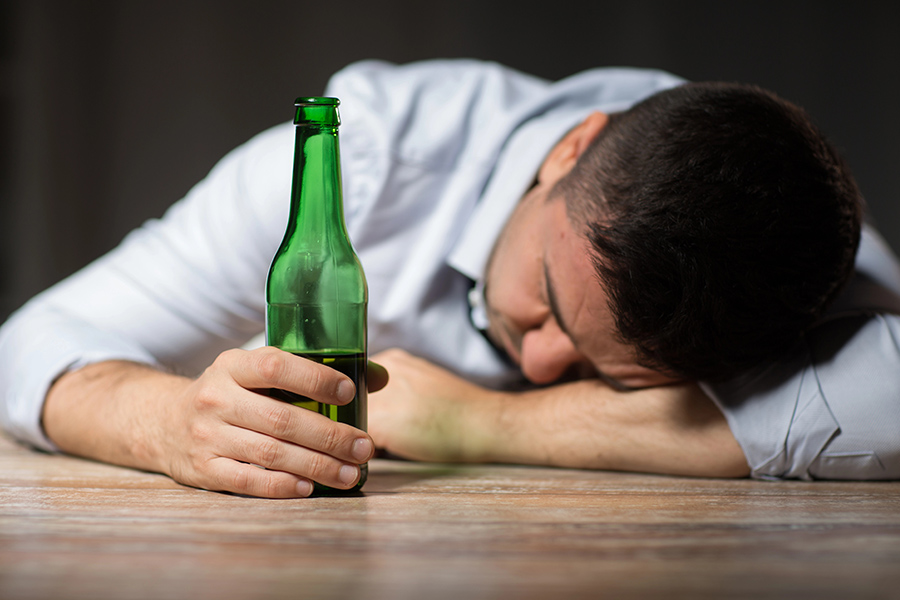Recent research suggests nearly half of all people with a severe mental illness also have a substance abuse disorder. When substance abuse happens simultaneously as someone is battling a mental illness, it’s called a co-occurring disorder. Although this can happen with any mental illness, a few common co-occurring disorders make up most (but not all) of these cases. Below you’ll learn about the nine most common co-occurring disorders and get the answers to some of your most pressing questions on the topic.

9 Common Co-Occurring Disorders
1. Generalized Anxiety Disorder (GAD)
Generalized anxiety disorder causes frequent, recurring panic attacks or bouts of extended anxiety. It may also cause symptoms like insomnia, hypersomnia, restlessness and a general inability to function in day-to-day life. This inability to function may be caused by sleep disturbances or anxiety.
People who live with GAD may turn to alcohol addiction or drug abuse for various reasons. Prescription drugs like Xanax or Valium are often prescribed to help calm anxiety. Unfortunately, these medications can also be very addictive. Some find themselves facing co-occurring disorders when hooked on these prescriptions. People with GAD may also turn to alcohol to help numb their constant worries, leading to substance abuse disorders.
2. Eating Disorders
The term “eating disorders” is an umbrella term covering any mental illness that affects a person’s relationship with food or their ability to eat it. Common examples of eating disorders are anorexia and bulimia, but other conditions exist.
People with this type of mental illness will often abuse diet pills and stimulants, which are supposed to help them lose weight and feel energized, respectfully. However, they may also turn to alcohol, which helps suppress appetite, or cocaine addiction, which is known to cause weight loss in some individuals.
3. Bipolar Disorder
Bipolar disorder is characterized by mood swings, with high periods known as mania and low periods known as depressive episodes. During mania episodes, you may feel extra confident, energized and productive while suffering from insomnia, jitteriness and an inability to concentrate. During depressive episodes, you may feel lethargic and have little desire to do anything while suffering from hypersomnia and low mood or apathy.
People with bipolar disorder often turn to substance abuse to cope with these mood swings. For example, alcohol or marijuana may be used during the manic episodes of this mental illness to calm down and sleep. Stimulants may be used to help promote energy during low periods. Some people with bipolar disorder may experiment with various substances to help balance moods or otherwise deal with the symptoms of this mental illness.

4. Post-Traumatic Stress Disorder (PTSD)
Post-traumatic stress disorder is a mental illness that develops after a person has been exposed to a traumatic event. A traumatic event can be any time you felt your life was threatened, you were abused or you experienced a period of very high stress, including natural or man-made disasters, war and being assaulted. PTSD can also happen if you witness those things (or worse) happening to another person, especially if you’re close to them.
The traumatic event itself often leads a person to substance abuse disorders as a way to forget what happened. People may experience flashbacks, panic attacks, nightmares and hallucinations with this mental illness. They can also suffer from physical symptoms of their mental illness, such as headaches, blurred vision, increased heart rate and digestive issues. Co-occurring disorders often happen when you try to escape the symptoms of PTSD.
5. Borderline Personality Disorder (BPD)
Borderline personality disorders are often confused with narcissistic personality disorders (NPD). While the two share a few things in common, such as difficulty in relationships and lashing out, the reason people with these personality disorders act out is the primary difference. While people with NPD act out of malice and a desire to hurt someone, people with BPD act out of a place of fear and insecurity. Symptoms of BPD can include severe mood swings, impulsive behavior, emotional imbalance and thoughts of self-harm.
Co-occurring disorders in those with this personality disorder happen because drug abuse or alcohol addiction are used as coping mechanisms. Most people with BPD suffered severe emotional trauma or neglect (usually in childhood), which leads to this mental illness developing. The reason behind BPD alone can lead a person to substance abuse.
6. Obsessive-Compulsive Disorder (OCD)
Contrary to popular belief, obsessive-compulsive disorder isn’t just an obsession with cleaning. Instead, a person with OCD suffers from compulsions, which are things they feel they have to do or something terrible will happen to them or someone they care about. For example, a person with OCD may believe that their parents will die if they don’t turn a door knob seven times before opening it. This mental illness falls under the umbrella term of anxiety disorders and can cause significant problems in day-to-day life.
Co-occurring disorders frequently happen in people with OCD as a way to “silence” compulsive thoughts. These thoughts may or may not be linked to auditory or visual hallucinations. When a person with OCD turns to substance abuse, it’s with the hope that they’ll feel normal and can go about their day without experiencing compulsions, which unfortunately isn’t the result drugs or alcohol end up having. In many people, substance abuse worsens compulsions and other OCD symptoms.
7. Schizophrenia
Schizophrenia is a severe mental health disorder that causes you to have difficulty distinguishing between fantasy and reality. People with this mental illness may have auditory, visual or olfactory hallucinations. They can also suffer delusions, disorganized thinking and psychosis. During psychosis, a person may entirely break from reality and have zero ability to distinguish their fantasies from the real world. Psychosis is much more common after a period of stress, anxiety or trauma.
Substance abuse is widespread in people with mental health disorders like schizophrenia that alter reality. Co-occurring disorders form as a way to cope with hallucinations and disorganized thinking but often serve only to make these mental health disorders worse.
8. Attention Deficit Hyperactivity Disorder (ADHD)
ADHD is a mental health disorder that causes impulsiveness, hyperactivity and an inability to focus. Often, those with ADHD show poor impulse control and seemingly disregard danger at an early age.
ADHD often leads to a co-occurring substance use disorder with prescription medications. Adderall is one of the most commonly prescribed medications to treat attention-related mental health issues. While it often works, Adderall can be very addictive and lead to someone needing addiction treatment.
9. Major Depressive Disorder
People with major depressive disorder, or simply depression, battle with extreme sadness, lethargy, sleep disturbances, irritability and anxiety. People with depression can find daily tasks and social gatherings exhausting and may be generally overwhelmed by life.
A substance use disorder often develops to help manage the symptoms of this mental health condition. For people with major depressive disorder, this often leads to an addiction to stimulants, which can temporarily help increase energy and overall drive.

Frequently Asked Questions About Co-occurring Disorders
If you or a loved one has been diagnosed with co-occurring disorders, it’s normal to have questions. Below are the answers to a few common questions about dual diagnosis.
How Common Are Co-Occurring Disorders?
According to the Substance Abuse and Mental Health Administration, more than nine million American adults have a co-occurring disorder. The National Institute of Mental Health estimates the number of American adults with mental health issues at around 52 million. These statistics show it’s pretty common for people battling mental illnesses to turn to drugs or alcohol as a form of self-medication or a coping mechanism.
Why Do Co-Occurring Disorders Occur So Frequently?
While nobody is positive why mental illness and addiction happen together so frequently, it’s generally assumed to be a combination of the following:
- Certain drugs can create mental illness after prolonged use.
- Many with mental illness use drugs or alcohol as a way to self-medicate instead of seeking professional help (either due to lack of health insurance, poverty or stigma).
- Drugs and alcohol are often used to temporarily escape concerning symptoms.
- Some prescription medications used to treat severe mental illnesses can be addictive and lead to a substance abuse problems.
What Types of Addiction May Occur With Mental Health Disorders?
Any addiction can occur with mental health disorders. The type of addiction usually varies based on the problem a person is hoping to treat. However, common addictive substances used include alcohol, cocaine and opioids.
What Are Some Risk Factors for Co-occurring Disorders?
Nobody is sure why some people develop co-occurring disorders and others don’t. However, there are a few risk factors experts commonly agree on. These include:
- Genetics: If you have a direct relative with a dual diagnosis, you’re more likely to develop it yourself.
- Addictive personality: Some people are more prone to addiction than others.
- Having an untreated mental health issue: People who don’t receive treatment for severe mental health problems are more at risk of developing a substance addiction than those who seek help.
- Poverty: Some believe poverty may play a role in dual diagnosis because people living below the poverty line have less access to mental health care.
Do Substance Abuse or Mental Disorders Happen First?
There’s no definitive answer to this question that would apply to all situations. Either substance abuse or a mental disorder can happen first, depending on the situation.
Mental disorders commonly happen first. Instead of seeking professional assistance for their condition, many turn to drugs and alcohol to self-medicate. Other times, a person with a mental illness may be prescribed an addictive substance for their condition and become addicted to it. This addiction to prescription drugs can lead to the abuse of other substances when the medication isn’t available, including cocaine, alcohol or heroin. In addition, certain disorders present with risk-taking behaviors, making a person more likely to try illicit drugs, which can lead to addiction.
However, long-term drug or alcohol abuse can also lead to mental health problems. This is especially true for any illicit drugs with mind-altering or mood-altering abilities. Over time, the substance can cause permanent alterations to the brain or create chemical imbalances. In turn, this can lead to the diagnosis of a mental health disorder that can persist long after someone gets sober.
Treatment for Co-Occurring Disorders
Treatment for co-occurring mental illnesses and substance use disorders requires treating both. For medical purposes, this is called dual diagnosis treatment. If the underlying mental health issues aren’t treated, the chances a person will relapse are high. Likewise, if a person battling one or more mental illnesses doesn’t undergo addiction treatment for their substance use disorder, they’ll continue suffering from poor quality of life.
Treatment for co-occurring disorders may include medication, therapy and support groups. Each dual diagnosis treatment plan needs to be customized to the individual. Medication-assisted treatment will be closely monitored, and addictive substances will be avoided whenever possible for those undergoing dual diagnosis treatment.
Camelback Recovery Is Here to Help With Dual Diagnosis Treatment
If you or a loved one has one of the common co-occurring disorders above, Camelback Recovery is here to help. Our dual diagnosis treatment program is designed to simultaneously treat the underlying mental health disorder and the drug or alcohol addiction. This ensures the greatest chance of overcoming co-occurring disorders.
For more information, call us today at (602) 466-9880. You can also fill out our online contact form and one of our administration or health professionals will be in touch with you as soon as possible.





